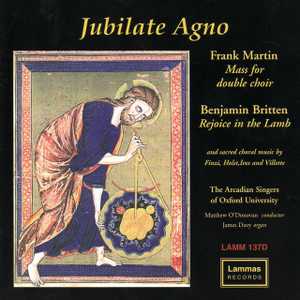Jubilate Agno

The Arcadian Singers of Oxford University
Kyrie eleison
Gloria
Credo
Sanctus
Benedictus
Agnus Dei
Salve Regina Pierre Villette
Magnificat Gerald Finzi
Nunc Dimittis Gustav Holst
Rejoice in the Lamb Benjamin Britten
Chorus: Rejoice in God
Treble solo: For I will consider my cat Jeoffry
Alto solo: For the mouse is a creature
Tenor solo: For the flowers are great blessings
Chorus: For I am under the same accusation
Bass solo: For H is a spirit
Chorus: For the instruments are by their rhimes
Chorus: Hallelujah from the heart of God
Total playing time 64m 03s
Jubilate Agno
The Arcadian Singers of Oxford University
The Arcadian Singers of Oxford University, commonly called The Arcadians, were founded in 1976, to specialise in unaccompanied works. The choir aims to comprise about 25 singers from throughout the university, who sing a variety of music, covering a wide range of styles — Bach to Britten, Monteverdi to MacMillan. The choir gives at least one concert in Oxford each term and has in recent years been involved in other musical ventures both in and out of Oxford. They are regularly invited to contribute to the Easter Liturgy at Ampleforth Abbey in Yorkshire. The making of this recording marks the choir’s 25th anniversary. More information can be found on the choir’s website
Matthew O’Donovan
Matthew O’Donovan was born in 1981 and received his early musical training as a chorister of St. Giles’ Church, Oxford under Peter Ward Jones and a music scholar at Abingdon School, where he studied the organ with John Oxlade, and later David Goode, his current teacher. After completing his A-levels in 1999 he spent a year as organ scholar of Southwell Minster, where he worked both as an accompanist and also conductor with the Minster’s two choirs, studying the organ with Paul Hale. During his year at Southwell he directed the local Four Tons Choir. Matthew came up to Oxford in October 2000, where he is reading for a music degree and is organ scholar at Merton College. He was appointed conductor of the Arcadian Singers from April 2001. As a pianist and violist, Matthew has played with many of Oxford’s local orchestras. He also sings with the early music ensemble Stile Antico and with the Schola Cantorum of Oxford. He is manic about DIY.
James Davy
James Davy is currently Organ Scholar of both Durham Cathedral and University College, Durham. He was born in 1980, and, in 1991, became a Chorister at Southwell Minster, where he also started to learn the organ with Philip Rushforth. During his gap year he was Organ Scholar of Portsmouth Cathedral; the first holder of the position; and continued his organ studies with Neil Cockburn in London, and studied harmony and counterpoint with the Sub-Organist Rosemary Field. James began a Music degree at the University of Durham in October 2000, gaining the Associateship Diploma of the Royal College of Organists in January 2001. Alongside his degree course he accompanies both the University Choral Society and Chamber Choir, with whom he toured Northern Italy in September 2001, and directs the Chapel Choir of University College. He is in demand both as a soloist and accompanist, and has appeared on recordings with the choir of Portsmouth Cathedral, as well as on ITV with the Durham University Chamber Choir. When not playing or directing, James enjoys listening to music ranging from early music to Trad. Jazz and watching films.
Recorded in Merton College, Oxford on 5th - 7th December 2001, by kind permission of the Warden and Scholars of the House or College of Scholars of Merton in the University of Oxford.
Produced by Stephen Shipley
Recorded and edited by Lance Andrews
Cover Illustration: An anonymous depiction of God as Architect,
from a mediaeval “Bible moralisée”; Cod.2554, fol.Iv, Bildarchiv d. ÖNB, Vienna.